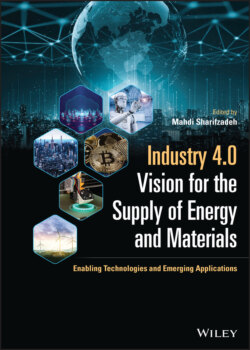Читать книгу Industry 4.0 Vision for the Supply of Energy and Materials - Группа авторов - Страница 43
1.5.1 3GPP Cellular: MTC
Оглавление3GPP characterized MTC as a form of data communication between machines in an autonomous manner that does not necessarily require human intervention [128]. MTC denotes two communications scenarios: (1) communication between MTC devices and MTC servers (e.g., in utility smart metering); and (2) direct communication between MTC devices without intermediate server (e.g., IoT) [128]. Although MTC could utilize different types of radio access technologies [129], MTC solutions based on mobile access technologies are of vital importance because cellular MTC offers viable benefits such as mobility, roaming support, robustness against single point of failures, and immediate and reliable data delivery [126, 128]. Moreover, scalability and ease of deployment in cellular MTC can be accomplished via an untethered method. Cellular MTC also excels the ability of connecting devices to the core enterprise systems through a standardized application programming interface (API), in a scalable, real-time, and secure way.
Although MTC offers compelling advantages, it exhibits shortcomings that impact the level of networking and viability of business models. The main challenges are relevant to the diversity of M2M applications and their requirements, energy consumption, and radio resources cost [130]. It also suffers from limited resources in MTC devices (e.g., computation, power resources) and traffic characteristics of MTC applications that are dependent on specific use cases [131]. Such characteristics bring up new technical issues that must be effectively addressed to fully support MTC in cellular systems [126, 130].
